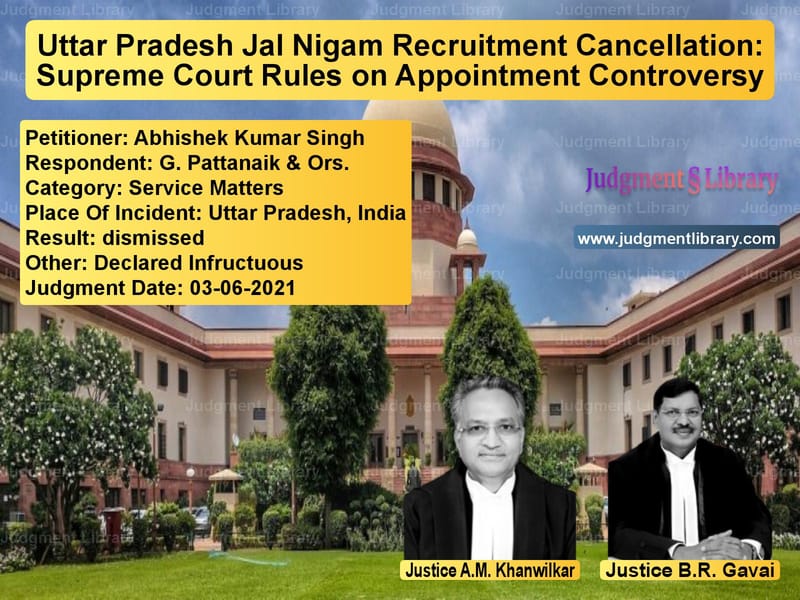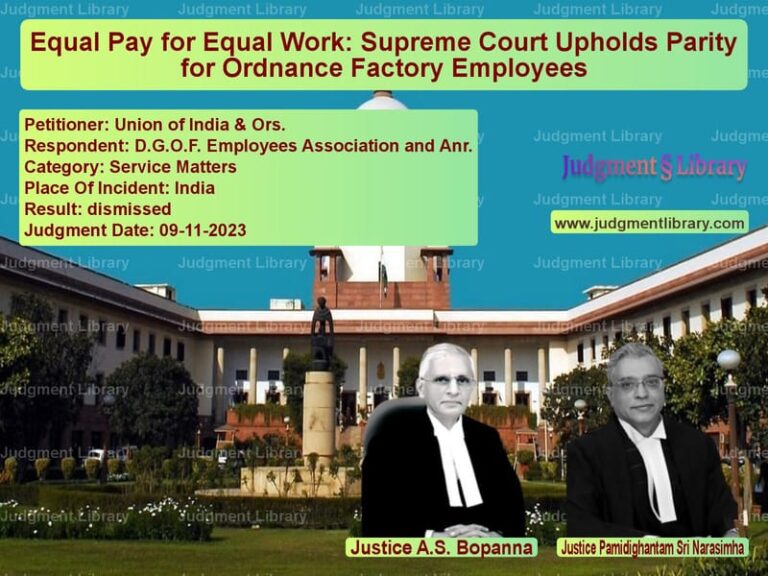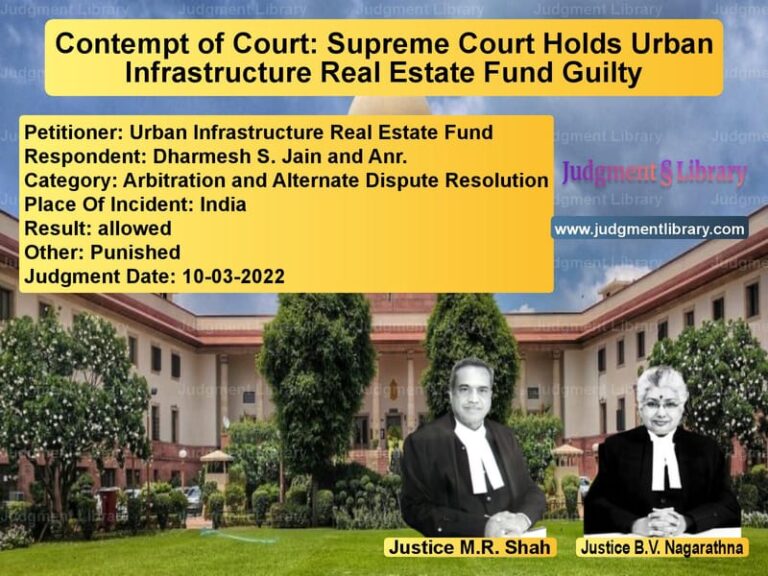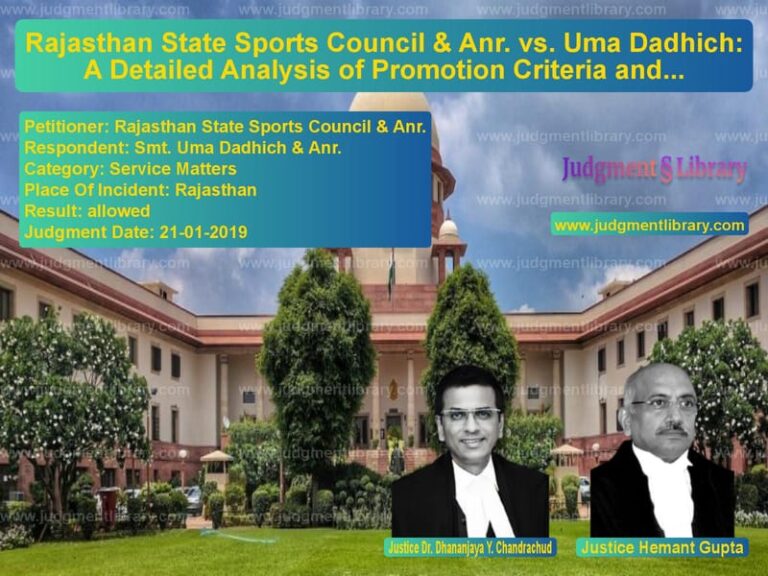Uttar Pradesh Jal Nigam Recruitment Cancellation: Supreme Court Rules on Appointment Controversy
The legal dispute concerning the recruitment of Assistant Engineers in the Uttar Pradesh Jal Nigam has been a prolonged battle, ultimately reaching the Supreme Court of India. The case, Abhishek Kumar Singh v. G. Pattanaik & Ors., involved multiple contempt petitions and writ petitions related to the alleged irregularities in the recruitment process, its subsequent cancellation, and the claim of affected candidates for reinstatement.
Background of the Case
The controversy began with the recruitment process for 122 Assistant Engineer posts in the Uttar Pradesh Jal Nigam in 2016-17. The process was challenged due to allegations of procedural lapses and corruption. The High Court of Allahabad had earlier ruled in favor of reinstating the affected candidates, leading to multiple appeals and contempt petitions before the Supreme Court.
Petitioner’s Arguments
The petitioners, led by Abhishek Kumar Singh, argued that:
- The recruitment process had been unfairly annulled without affording them a chance to present their case.
- The High Court had ruled in their favor, directing their reinstatement with full back wages.
- The Uttar Pradesh Jal Nigam violated court orders by refusing to grant continuity of service and arrears.
- The subsequent cancellation of the entire recruitment process was arbitrary and violated their fundamental rights under Articles 14, 19(1)(g), and 21 of the Constitution.
Respondents’ Arguments
The Uttar Pradesh Jal Nigam, represented by its legal team, contended that:
- The recruitment process was marred by large-scale corruption, as found by multiple investigative agencies, including the Special Investigation Team (SIT).
- The appointment letters were issued without properly verifying the legitimacy of the candidates.
- Segregating tainted and untainted candidates was impossible due to missing primary data from the recruiting agency.
- Cancellation of the recruitment was the only fair option available to maintain transparency in government appointments.
Supreme Court’s Observations
The Supreme Court, led by Justices A.M. Khanwilkar and B.R. Gavai, made several key observations:
- The High Court’s ruling to reinstate candidates was based on procedural lapses rather than addressing the larger issue of corruption.
- Even though the petitioners were denied a hearing before their appointments were canceled, the larger issue of irregularities in the recruitment process needed to be considered.
- Investigative reports from IIT Kanpur, IIIT Allahabad, and the Special Investigation Team (SIT) confirmed severe procedural misconduct, making it impossible to identify legitimate candidates.
- The Supreme Court acknowledged that “when a recruitment process is fundamentally tainted, the entire process can be annulled without issuing individual notices to candidates.”
Final Judgment
The Supreme Court upheld the Uttar Pradesh Jal Nigam’s decision to cancel the entire recruitment process. The court ruled that:
- The annulment of appointments was valid as it was impossible to separate eligible and ineligible candidates.
- The demand for full back wages and continuity of service was denied due to the corruption-tainted recruitment process.
- The petitioners were free to pursue alternative remedies under Article 226 of the Constitution by approaching the High Court.
- The contempt petitions against the Uttar Pradesh Jal Nigam for not reinstating candidates were dismissed.
Impact of the Judgment
The ruling has far-reaching implications for government recruitment processes, reinforcing that:
- A recruitment process can be entirely scrapped if found to be corrupt or irregular.
- Candidates cannot claim a vested right to employment based on flawed selection processes.
- Government agencies must maintain proper audit trails and transparency to avoid legal challenges.
Conclusion
The Supreme Court’s decision in this case highlights the importance of integrity in public sector recruitment. It affirms that courts cannot direct reinstatement in a recruitment process that is fundamentally compromised. While the judgment has disappointed the affected candidates, it sets a precedent for maintaining fairness and transparency in government hiring.
Read also: https://judgmentlibrary.com/supreme-court-judgment-on-family-business-appointment-and-termination/
Petitioner Name: Abhishek Kumar Singh.Respondent Name: G. Pattanaik & Ors..Judgment By: Justice A.M. Khanwilkar, Justice B.R. Gavai.Place Of Incident: Uttar Pradesh, India.Judgment Date: 03-06-2021.
Don’t miss out on the full details! Download the complete judgment in PDF format below and gain valuable insights instantly!
Download Judgment: abhishek-kumar-singh-vs-g.-pattanaik-&-ors.-supreme-court-of-india-judgment-dated-03-06-2021.pdf
Directly Download Judgment: Directly download this Judgment
See all petitions in Recruitment Policies
See all petitions in Termination Cases
See all petitions in Judgment by A M Khanwilkar
See all petitions in Judgment by B R Gavai
See all petitions in dismissed
See all petitions in Declared Infructuous
See all petitions in supreme court of India judgments June 2021
See all petitions in 2021 judgments
See all posts in Service Matters Category
See all allowed petitions in Service Matters Category
See all Dismissed petitions in Service Matters Category
See all partially allowed petitions in Service Matters Category







